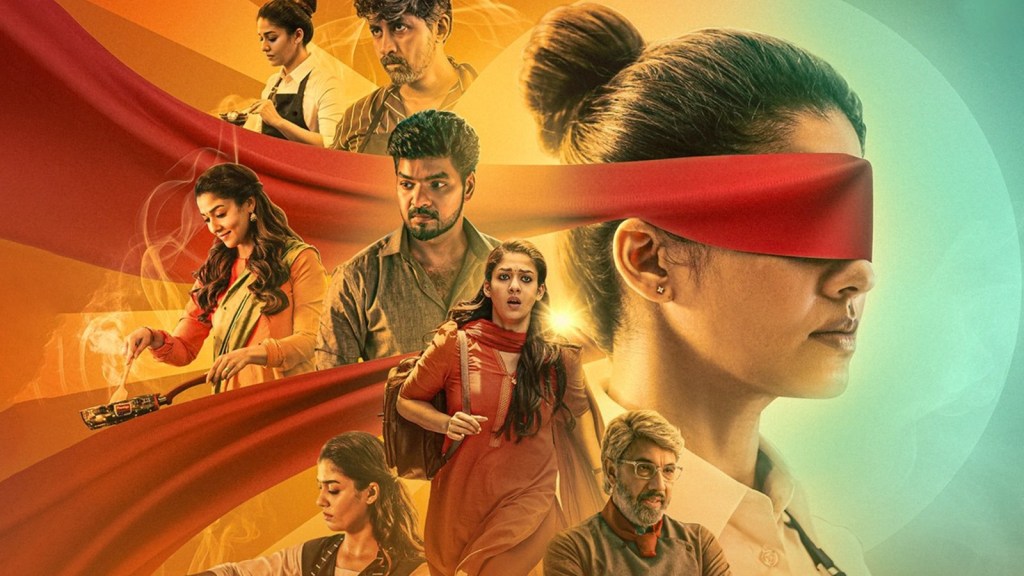Steaming platform Netflix has removed a film after criticism of its content in India (Picture: Netflix)
Netflix has faced backlash so severe against one of its films that it has been removed from the streaming platform.
The film in question has been pulled from Netflix in India and other countries after offending right-wing Hindu groups.
Annapoorani: The Goddess of Food tells the story of an aspiring female chef, played by Nayanthara – one of the highest-paid actresses in India – who wants to pursue a degree in hotel management and climb the ladder to become a corporate chef like her idol.
A short synopsis linking to the film on Netflix, which now shows that the page can’t be found, reads: ‘The daughter of a temple cook goes against her family’s wishes to make non-vegetarian food to prove she’s a talented chef in her own right.’
Annapoorani, who is a member of a Brahmin caste family, is shown cooking and eating meat in the film, which is something not traditionally consumed by Brahmins, Hindu priests or holy figures.
It has also been criticised for including an allegedly offensive depiction of the Hindu deity Lord Ramthat, implying that he ate meat while in exile.
The film sparked an online backlash and protests outside Netflix offices (Picture: Reuters)
Other content in the film which came under fire included accusations that it was supposedly promoting ‘love jihad’ by having its Hindu central character Annapoorani fall in love with Muslim character Farhan (played by Jai) who ‘brainwashes the actress to eat meat because he says Bhagwan Shri Ram and Maa Sita also ate meat’.
That’s how a formal police report read from Ramesh Solanki, who identified himself as ‘founder of Hindu IT Cell, a social worker and Hindu activist’, which was filed against the movie’s director, producers and lead actress, as well as Zee Studios chief business officer and the head of Netflix in India.
‘Love jihad’ is an unproven conspiracy among the Hindu right-wing that Muslims are tricking Hindus into marriage in order to convert them.
Vishwa Hindu Paishad (VHP), a hardline right-wing Hindu group with links to Prime Minister Narendra Modi’s Bharatiya Janata Party (BJP) in India, kicked off the intense protest against Annapoorani on Wednesday after it landed on Netflix on December 29.
According to The Guardian, it claimed that the film had been ‘intentionally released to hurt Hindu sentiments’ as its online campaign led to protests outside Netflix’s offices as well, alongside the fringe right-wing Hindu group complaints to policer.
Within 24 hours, the film’s makers, Zee Entertainment, had issued an apology and stated that the film would be taken down from Netflix and re-edited to remove any offensive scenes.
‘We have no intentions as co-producers of the film to hurt the religious sentiments of the Hindus and Brahmins community and would like to hereby apologise for the inconvenience caused and hurt caused to the sentiments of the respective communities,’ said Zee Entertainment in a statement.
Annapoorani: The Goddess of Food showed a Brahmin woman, traditionally vegetarian, cooking and eating meat (Picture: Zee Studios)
‘The film has been removed at the licensor’s request,’ a Netflix spokesperson confirmed to Variety.
Christopher Nolan’s box office triumph Oppenheimer also faced fierce criticism in India from Hindu nationalists for the inclusion of holy text the Bhagavad Gita in a raunchy scene between Cillian Murphy and Florence Pugh.
Ther BJP also condemned the film, calling it a ‘disturbing attack on Hinduism’ and accusing it of being ‘part of a larger conspiracy by anti-Hindu forces.’
Metro.co.uk has contacted Netflix and Zee Entertainment for comment.
Got a story?
If you’ve got a celebrity story, video or pictures get in touch with the Metro.co.uk entertainment team by emailing us celebtips@metro.co.uk, calling 020 3615 2145 or by visiting our Submit Stuff page – we’d love to hear from you.
MORE : True story behind Netflix’s ‘perfect and harrowing’ new series fans rate ’10/10′
MORE : Awards season 2024 is about to be the best in years – and this is why we’re all hooked
The film was accused of being ‘intentionally released to hurt’.


